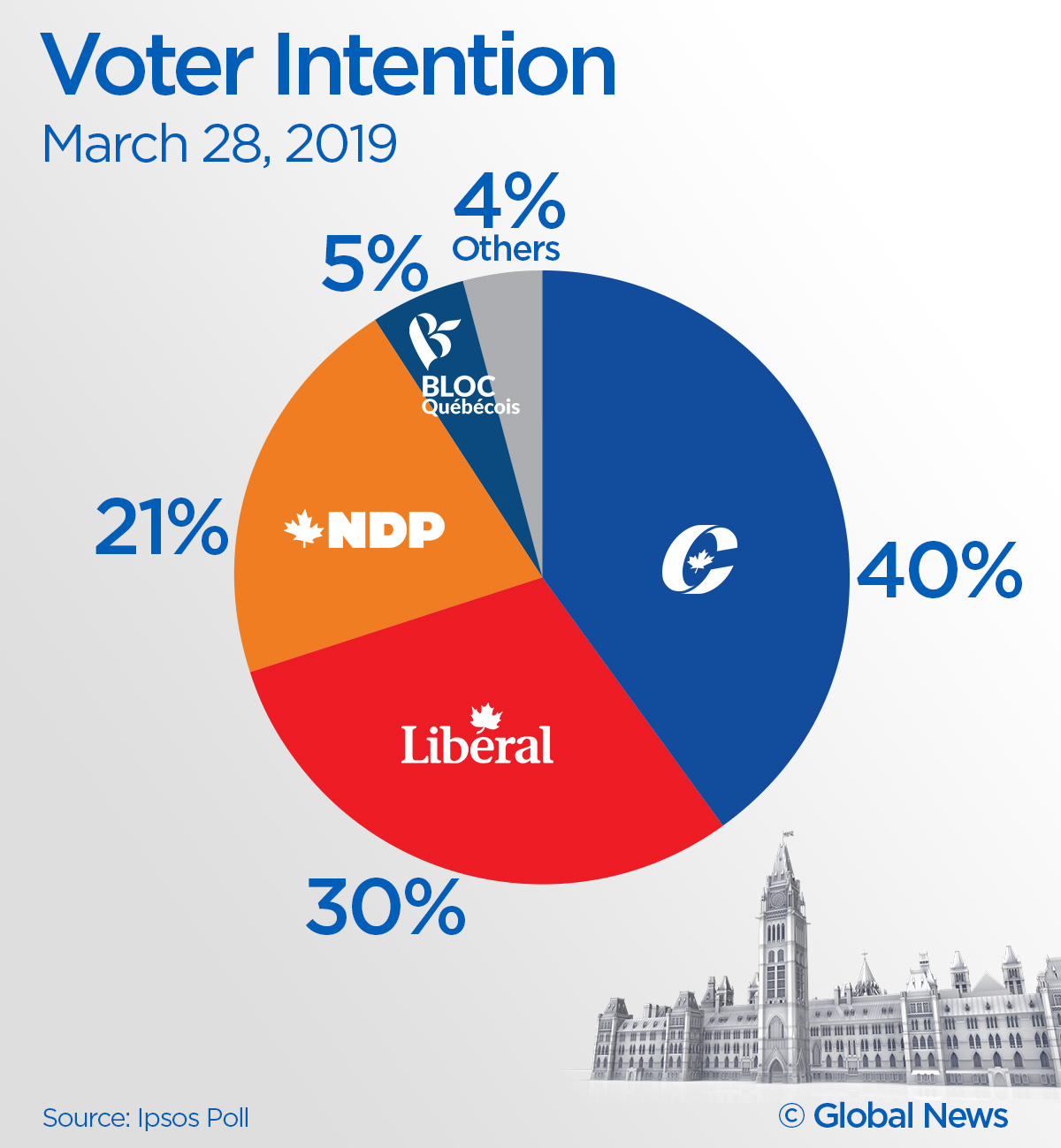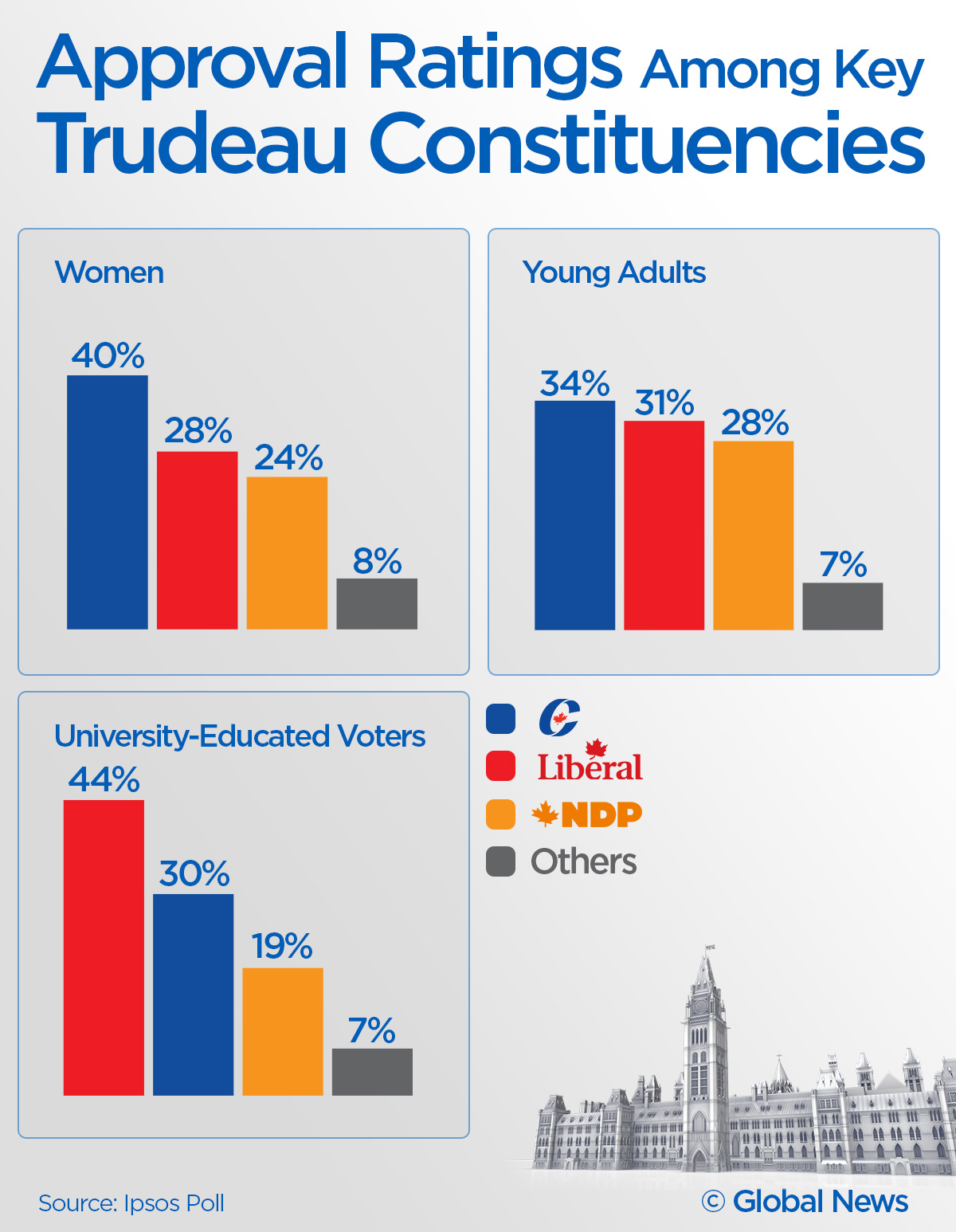Prime Minister Justin Trudeau appears to have suffered more damage from the SNC-Lavalin scandal than U.S. President Donald Trump has from the Russia investigation, hush money payments to a porn star, alleged campaign finance violations, threats of impeachment proceedings and the litany of new investigations launched by Democrats.

That’s according to a new Ipsos poll, conducted exclusively for Global News, which found that Trudeau’s approval rating (40 per cent) has now slipped below Trump’s (43 per cent), even as the Conservative Party established a double-digit lead over the Liberals.
The Liberal government’s federal budget did little to quell the damage, the poll found, with most Canadians indifferent about it and only a small minority impressed by Finance Minister Bill Morneau’s offerings.
The Conservatives are now sitting pretty in crucial provinces Ontario and British Columbia, with Trudeau managing to fall behind among two of the key demographics that swept him to victory in 2015, women and young people.

If an election were held tomorrow, the Conservatives would receive 40 per cent of the vote among decided voters, according to the poll of 1,002 Canadians conducted between March 25 and 27.
That’s unchanged since Ipsos’ last poll on March 4.
The Liberals would receive 30 per cent of the vote — down one point — while the NDP would receive 21 per cent and the Bloc Quebecois five per cent.
“Whatever this SNC-Lavalin thing is, it seems to have settled in. We’re creating a new normal in which the Conservatives are consistently ahead of the Liberal Party,” said Darrell Bricker, CEO of Ipsos Public Affairs.
“People in Ottawa can say what they want about the significance of the scandal — ‘there’s no sex, there’s no money, what is this all about?’
“But Canadians are sitting back and saying this has really caused them to reconsider supporting a combination of this prime minister and this Liberal government.”
The province-by-province breakdown makes for worrying reading for the Liberals.
In seat-rich Ontario, the Conservatives (40 per cent) have opened up a 12-point lead over the Liberals, who are tied with the NDP at 28 per cent.
The Tories also enjoy a double-digit lead in British Columbia, where the Liberals and NDP are in a scrap for second place.
Alberta looks to be a foregone conclusion, with the Conservatives (63 per cent) light-years ahead of the Liberals (17 per cent) and NDP (15 per cent).
“When you take a look at where the Conservatives are leading, they’re now leading everywhere you need to lead,” Bricker said. “They really don’t need anything else to beat the Liberals.”
WATCH: Prime Minister in campaign mode in B.C.

Indeed, the only province in which the Liberals are in pole position is Quebec, where they have the support of 38 per cent of respondents.

Get daily National news
However, the Conservatives (25 per cent) and Bloc Quebecois (23 per cent) appear to have enough strength to prevent the Liberals from truly taking advantage of their Quebec share as they did in 2015.
The NDP, with only 12 per cent of the vote support, is poised to lose most if not all of its seats in Quebec. But it’s not the Liberals who stand to gain from Quebecers deserting the NDP, Bricker said.
“These are not people who are Liberal-NDP switchers. These are probably Bloc Quebecois voters who couldn’t vote Bloc last time because of all the problems they were having, combined with people who voted for the Coalition Avenir Quebec,” Bricker said.
WATCH: NDP faces steep ‘incumbency disadvantage’

Compounding the Liberals’ misery is the fact that their leader is now bleeding support among some of the core constituencies that helped sweep him to power in 2015.
Forty per cent of women now say they would vote Conservative, compared to just 28 per cent for the Liberals (the Tories enjoy a similar lead among men).
Among younger voters aged 18 to 34, the Conservatives (34 per cent) hold a slight lead over the Liberals (31 per cent).
The only key subset among which the Liberals lead is the university-educated, with 44 per cent approval compared to 30 per cent for Conservatives.
“What’s happened is that the brand that Trudeau had — he had a strong appeal among young people, and there was a gender gap that worked in his favour — all seems to be gone,” Bricker said.
Indeed, Trudeau’s individual approval rating as prime minister now sits at 40 per cent, three points lower than that of Trump in the U.S.
Trudeau’s 40 per cent rating is also lower than that of former prime minister Stephen Harper at this stage in 2015, with Harper having a 47 per cent rating in April 2015.
READ MORE: Almost half of Americans still believe Trump colluded with Russia, according to Reuters/Ipsos poll
Furthermore, any hopes that the Liberals might have had about the federal budget prompting a rebound in their fortunes appear to have dissipated, the poll suggests.
Asked how they felt about Budget 2019, 64 per cent of Canadians said they were indifferent, a figure that includes 67 per cent of Liberal supporters. Twenty-five per cent said the budget was bad, while 11 per cent said it was good.
“There are only a certain number of cards a government can play, and the single biggest one is the budget, particularly a pre-election budget,” Bricker said. “You’re hoping that you’re going to get noticed, you’re going to get on the radar, that this is going to contrast you with your opponents.
“The worst outcome you can have is that they hate the budget, and the second-worst is that they ignore it — and they ignored it.”
WATCH: Scheer calls Liberal spending plan ‘most expensive cover-up in history of cover-ups’

If the source of many of the Liberal Party’s woes is the SNC-Lavalin scandal, that’s also where they need to look for solutions to turn their situation around, Bricker said.
“The first thing Trudeau has to recognize is that what he’s doing now isn’t working,” he said. “If this is the strategy — to go on, day by day, fighting it out with his opponents in his own caucus and dealing with the media the way that he has — it’s not working.
“Every day, it’s getting a little bit worse.”
ANALYSIS: Biggest peril for Team Trudeau is that Liberals are at war with each other
Bricker said it’s high time Trudeau thinks about allowing former attorney-general Jody Wilson-Raybould and former Treasury Board president Jane Philpott to speak out about the SNC-Lavalin affair.
“Every day that it goes on, it just confirms people’s worst fears… If there’s a really good story that the government has and it’s not going to be as damaging as what the two dissident former ministers are going to say, you’d better let them talk.
“This isn’t going away.”
WATCH: Ethics Committee rejects opposition call for new SNC-Lavalin probe

Despite the Conservatives’ strong current position, Bricker says Conservative Leader Andrew Scheer will eventually need to do more than simply put his feet up and watch the Liberal Party implode under the weight of SNC-Lavalin.
“At some point, people are going to turn to the question of, ‘OK, if not Justin Trudeau, what does his likely replacement look like?’ and Scheer’s going to have to be ready to be able to respond to both the hopes and the fears that Canadians would have about him,” Bricker said.
READ MORE: Scheer says Liberals used federal budget as a ‘political prop’
“The truth is that, at the moment, Canadians don’t really know anything about him.
“It’s going to be an interesting test when the lights turn on and the cameras turn his way, how he’s going to be able to respond. At this point of the game, we just don’t know.”
WATCH: Poll: Support for Liberals slips to 30%

Exclusive Global News Ipsos polls are protected by copyright. The information and/or data may only be rebroadcast or republished with full and proper credit and attribution to “Global News Ipsos.” This poll was conducted between March 25 and 27, 2019, with a sample of 1,002 adults living in Canada polled. The precision of Ipsos online polls is measured using a credibility interval. This poll is accurate to within +/ – 3.5 percentage points, 19 times out of 20, had all Canadian adults been polled.










Comments
Want to discuss? Please read our Commenting Policy first.